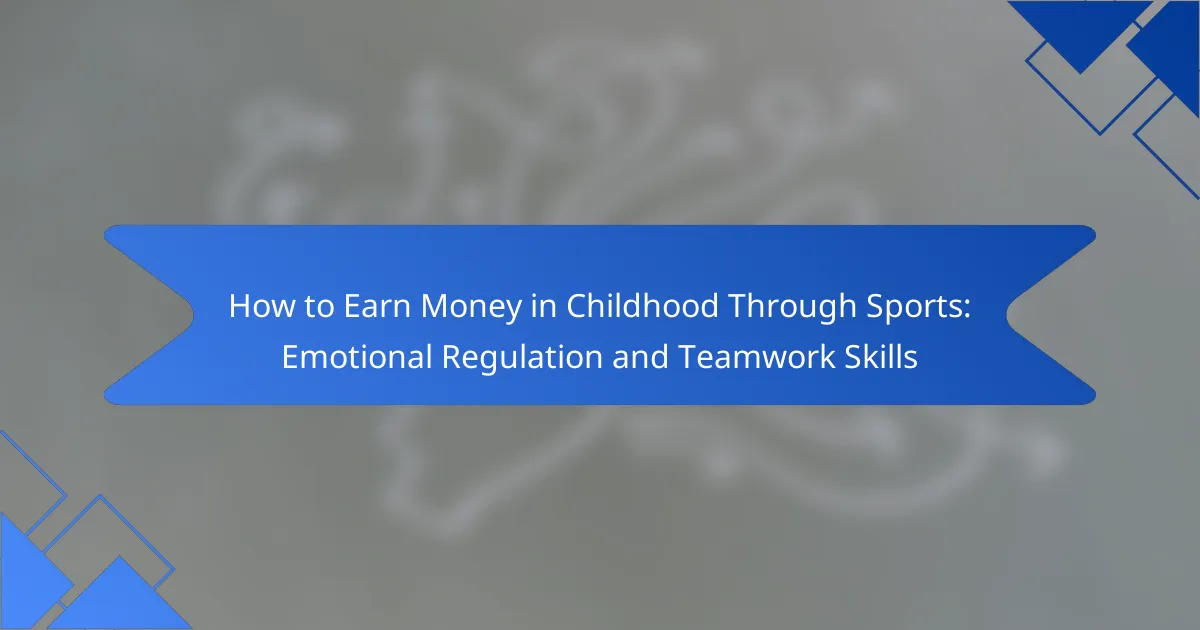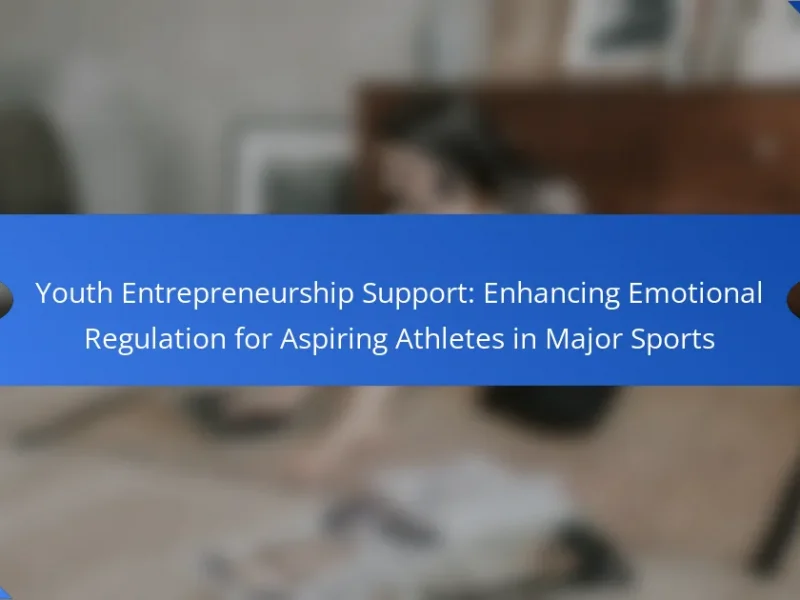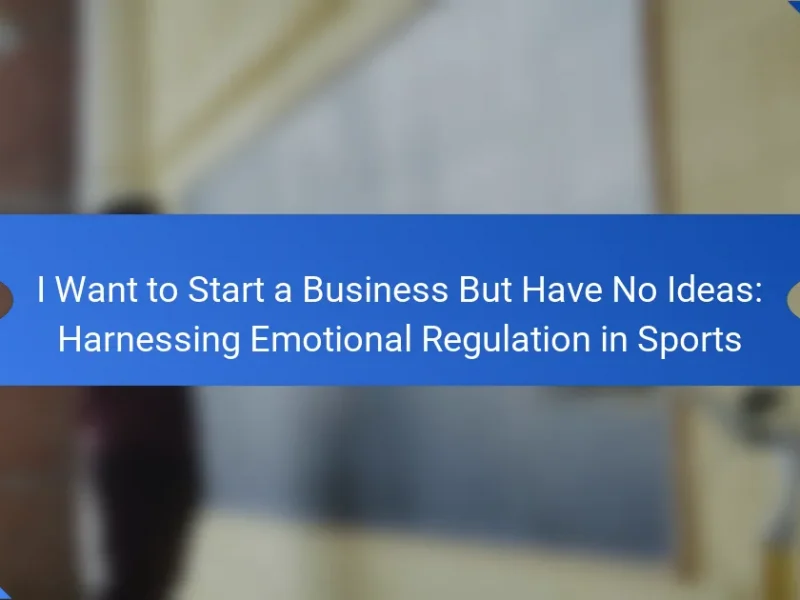Earning money through sports can be a rewarding experience for children, but it requires essential skills like emotional regulation and teamwork. This article explores how effective emotional management enhances participation and performance in sports. It also discusses unique strategies for developing these skills, such as mindfulness and team-building exercises. Additionally, it highlights the role of parents in fostering a supportive environment that encourages resilience and collaboration among young athletes.
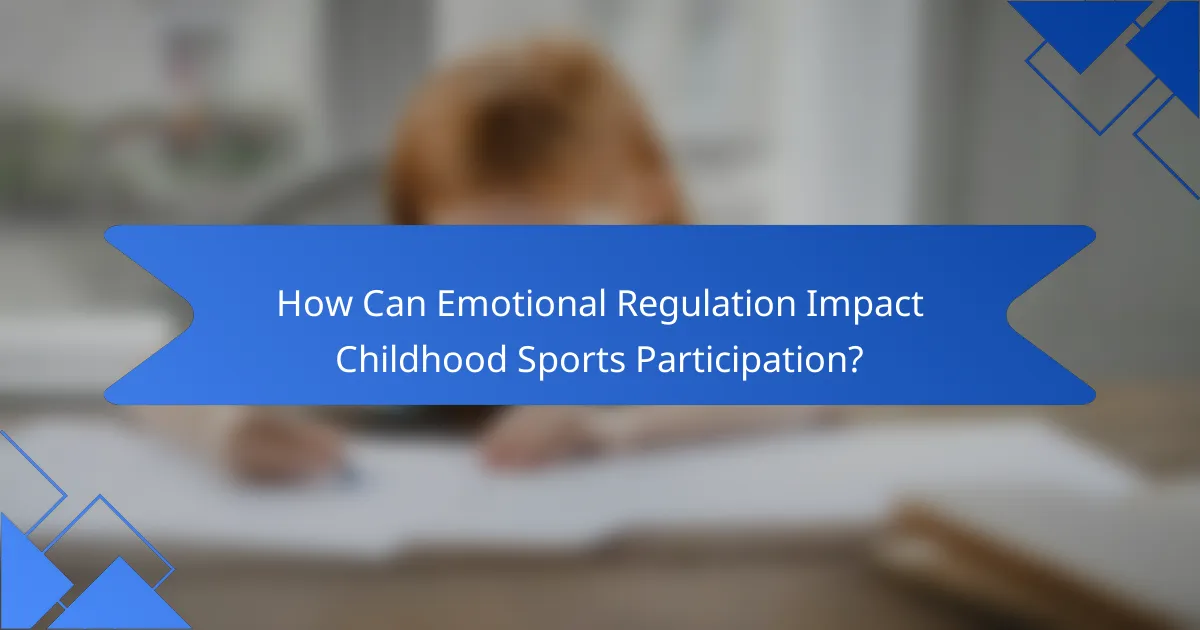
How Can Emotional Regulation Impact Childhood Sports Participation?
Emotional regulation significantly enhances childhood sports participation by fostering resilience and teamwork. Children who manage their emotions effectively are more likely to engage positively with teammates and coaches. This leads to improved collaboration and communication skills, essential for team dynamics. As a result, children experience increased enjoyment and motivation in sports, which can translate into financial opportunities through scholarships or sponsorships. Developing emotional regulation not only benefits athletic performance but also prepares children for future challenges in various aspects of life.
What Are the Key Emotional Regulation Skills Beneficial for Young Athletes?
Key emotional regulation skills for young athletes include self-awareness, impulse control, and emotional expression. These skills help manage stress and enhance performance. Self-awareness allows athletes to recognize their emotions, while impulse control aids in making thoughtful decisions under pressure. Emotional expression encourages healthy communication within a team, fostering collaboration and teamwork. Developing these skills not only improves athletic performance but also contributes to personal growth and resilience in challenging situations.
How Can Coaches Facilitate Emotional Regulation in Youth Sports?
Coaches can facilitate emotional regulation in youth sports by creating a supportive environment. They should teach athletes to recognize and manage their emotions, which enhances teamwork skills. Regular feedback and open communication foster resilience and coping strategies. Incorporating mindfulness practices during training sessions promotes self-awareness and emotional control.
What Role Does Teamwork Play in Developing Emotional Regulation?
Teamwork plays a crucial role in developing emotional regulation by fostering collaboration and communication. Engaging in sports teaches children to manage their emotions, adapt to different situations, and respond constructively to challenges. As a result, children learn to regulate their feelings effectively, which enhances their social skills and resilience. The unique attribute of teamwork in sports is its ability to create a supportive environment where children can practice emotional expression and receive feedback from peers. This collaborative experience not only builds emotional intelligence but also prepares them for future interpersonal interactions.
Which Team Activities Enhance Emotional Regulation Skills?
Team activities that enhance emotional regulation skills include collaborative sports, role-playing games, and team-building exercises. These activities promote self-awareness, empathy, and resilience. For example, participating in football teaches players to manage frustration and celebrate successes collectively. Engaging in cooperative tasks fosters communication, helping children express emotions constructively. As a result, these experiences build a foundation for emotional intelligence, essential for teamwork and personal development.
How Do Emotional Regulation Systems Vary Across Different Sports?
Emotional regulation systems vary significantly across different sports due to the unique demands of each activity. For instance, team sports like football require players to manage emotions collectively, fostering teamwork and communication. In contrast, individual sports such as tennis often necessitate personal emotional control, focusing on self-motivation and resilience.
The intensity of competition also influences emotional regulation. High-stakes sports, like competitive swimming, demand athletes to cope with pressure, enhancing their emotional resilience. Meanwhile, recreational sports may promote a more relaxed approach to emotional management, emphasizing enjoyment and social interaction.
Research indicates that athletes in team sports develop stronger interpersonal skills, enhancing their ability to navigate emotions within a group dynamic. Conversely, individual sports athletes often exhibit heightened self-awareness and personal accountability in emotional regulation.
Understanding these variations can help young athletes develop essential emotional and teamwork skills, ultimately contributing to their personal growth and potential financial success through sports.
What Unique Emotional Challenges Do Individual Sports Present?
Individual sports present unique emotional challenges such as heightened pressure and isolation. Athletes often face intense self-expectations, leading to anxiety and stress. This pressure can inhibit emotional regulation, making it difficult to cope with performance fluctuations. Unlike team sports, individual athletes may lack immediate social support, increasing feelings of loneliness. Developing teamwork skills can help mitigate these challenges by fostering connections with peers and creating a support network.
How Do Team Sports Foster Emotional Resilience?
Team sports significantly enhance emotional resilience by fostering teamwork and emotional regulation skills. Participation in team sports encourages children to navigate challenges collectively, promoting coping strategies during stressful situations. For instance, players learn to manage disappointment from losses and celebrate successes, cultivating a balanced emotional response. Research indicates that children engaged in team sports exhibit improved self-esteem and social skills, which are crucial for emotional resilience. Thus, the collaborative nature of team sports serves as a vital platform for developing these essential life skills.

What Are the Universal Benefits of Emotional Regulation in Sports?
Emotional regulation in sports enhances performance, teamwork, and resilience. It allows young athletes to manage stress, leading to better focus and decision-making during competitions. This skill fosters a positive team environment, encouraging collaboration and communication. Additionally, mastering emotional regulation can boost self-confidence, which is crucial for personal development in childhood sports.
How Can Emotional Regulation Improve Performance in Young Athletes?
Emotional regulation significantly enhances performance in young athletes by fostering focus and resilience. It helps them manage stress and anxiety, leading to better decision-making during competitions. Improved emotional control cultivates teamwork skills, enabling athletes to communicate effectively and support each other. As a result, athletes can achieve higher levels of performance and enjoyment in their sports activities.
What Are the Long-Term Benefits of Emotional Regulation Skills?
Emotional regulation skills provide long-term benefits such as improved mental health, enhanced relationships, and better decision-making. These skills help children manage their emotions effectively, leading to reduced anxiety and stress. As a result, they can engage more positively in teamwork, fostering collaboration and communication. Additionally, emotional regulation contributes to resilience, enabling children to bounce back from setbacks in sports and life.

What Unique Emotional Regulation Strategies Are Effective in Youth Sports?
Unique emotional regulation strategies effective in youth sports include mindfulness techniques, cognitive reframing, and team-building exercises. These methods help young athletes manage stress and enhance performance. Mindfulness techniques, such as breathing exercises, promote focus and calmness. Cognitive reframing encourages athletes to shift negative thoughts into positive outcomes, fostering resilience. Team-building exercises strengthen communication and trust among teammates, creating a supportive environment. Implementing these strategies not only improves emotional regulation but also enhances overall teamwork skills, essential for success in sports.
How Can Visualization Techniques Aid Emotional Regulation?
Visualization techniques significantly enhance emotional regulation by fostering self-awareness and focus. These techniques allow individuals to mentally rehearse scenarios, which can reduce anxiety and improve emotional responses during challenging situations. For instance, athletes often visualize successful performances to boost confidence and manage stress. This practice not only sharpens their skills but also cultivates teamwork by aligning group dynamics and enhancing communication. Ultimately, visualization serves as a powerful tool for developing emotional resilience and collaborative abilities in sports contexts.
What Role Does Positive Reinforcement Play in Emotional Growth?
Positive reinforcement significantly enhances emotional growth by fostering a supportive environment. It encourages children to engage in sports, promoting teamwork skills and emotional regulation. Recognizing achievements boosts self-esteem, leading to improved social interactions. As a result, children learn to manage emotions effectively, enhancing their overall development. Positive reinforcement also cultivates resilience, allowing them to face challenges in sports and life. This process creates a foundation for lifelong emotional skills and healthy relationships.

What Rare Emotional Regulation Techniques Can Young Athletes Explore?
Young athletes can explore rare emotional regulation techniques such as visualization, mindful breathing, and emotional journaling. These strategies enhance focus and resilience during competitions. Visualization involves imagining successful performances, which boosts confidence. Mindful breathing helps manage anxiety by promoting relaxation. Emotional journaling allows athletes to process feelings and reflect on experiences. Implementing these techniques fosters teamwork skills and emotional intelligence, crucial for earning money through sports.
How Can Mindfulness Practices Be Integrated into Youth Sports?
Integrating mindfulness practices into youth sports enhances emotional regulation and teamwork skills. Techniques such as breathing exercises and visualization can help young athletes manage stress and improve focus. Regular mindfulness sessions build resilience, fostering a positive team environment. Research shows that athletes who practice mindfulness demonstrate better emotional control, leading to improved performance and collaboration on and off the field.
What Are the Limitations of Traditional Emotional Regulation Approaches?
Traditional emotional regulation approaches often fail to address the unique needs of children in sports. These methods may overlook the importance of teamwork skills and the dynamic emotional landscape of youth sports. They can be too rigid, focusing solely on self-control rather than fostering collaboration. Additionally, traditional strategies may not account for the social context of team sports, which is crucial for developing interpersonal skills. As a result, children may struggle to adapt these techniques in real-time, limiting their effectiveness in emotionally charged situations during games.
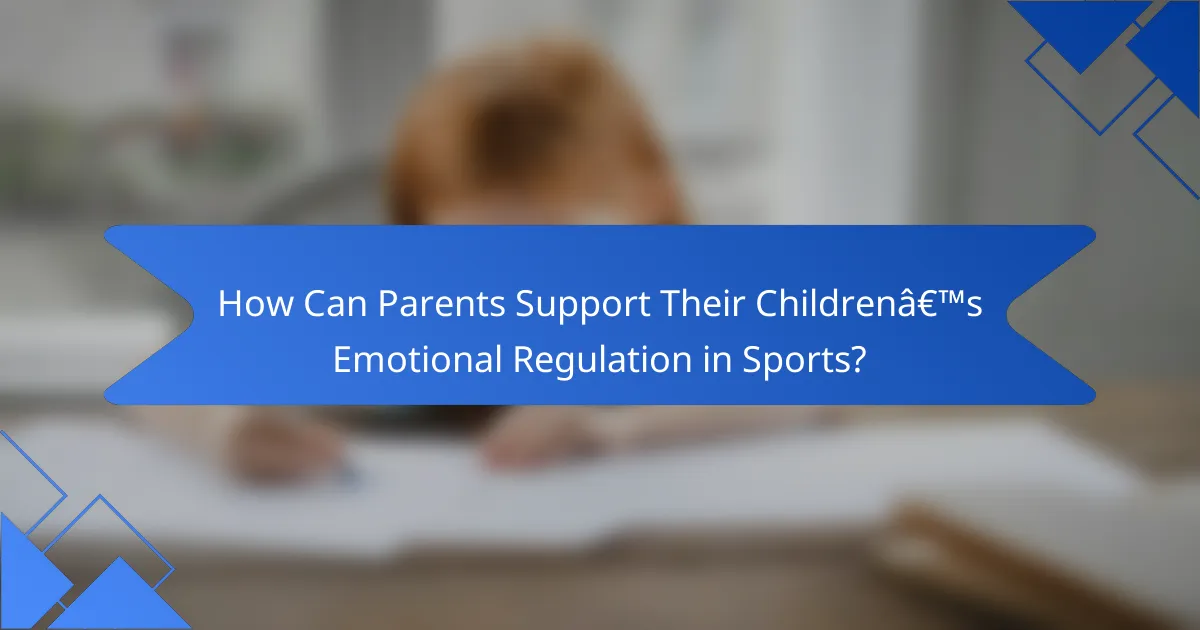
How Can Parents Support Their Children’s Emotional Regulation in Sports?
Parents can support their children’s emotional regulation in sports by fostering a positive environment and encouraging open communication. Active involvement in practices and games helps parents understand their child’s emotional needs. Teaching coping strategies, such as deep breathing or visualization, can enhance emotional resilience. Setting realistic expectations allows children to navigate challenges without fear of failure. Regular discussions about feelings and experiences in sports promote emotional awareness. Additionally, emphasizing teamwork skills cultivates a sense of belonging and support among peers, further enhancing emotional regulation.
What Common Mistakes Should Parents Avoid When Encouraging Sports Participation?
To encourage sports participation effectively, parents should avoid pressuring their children, comparing them to others, and focusing solely on winning. These mistakes can lead to anxiety and decreased motivation. Instead, fostering a supportive environment that emphasizes enjoyment and personal growth promotes emotional regulation and teamwork skills. Encouraging children to set personal goals can enhance their experience and build resilience.
What Best Practices Can Enhance Emotional Regulation Skills in Young Athletes?
To enhance emotional regulation skills in young athletes, focus on structured practices like mindfulness, positive reinforcement, and open communication. Mindfulness exercises help athletes recognize and manage their emotions during games. Positive reinforcement encourages resilience and boosts self-esteem. Open communication fosters a supportive environment, allowing athletes to express feelings and seek guidance. These strategies collectively promote emotional stability, essential for teamwork and performance.
